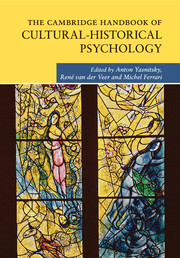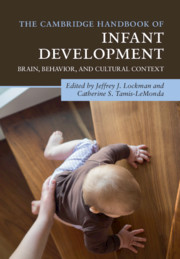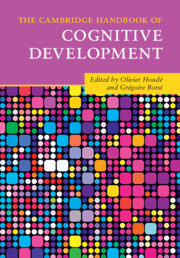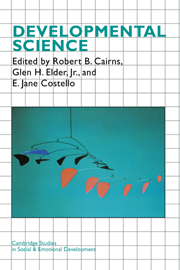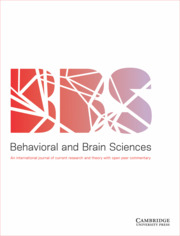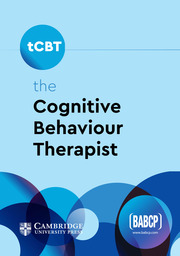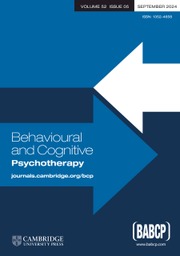The Cambridge Handbook of Cultural-Historical Psychology
Part of Cambridge Handbooks in Psychology
- Editors:
- Anton Yasnitsky, University of Toronto
- René van der Veer, Universiteit Leiden
- Michel Ferrari, University of Toronto
- Date Published: March 2017
- availability: Available
- format: Paperback
- isbn: 9780521139946
Paperback
Other available formats:
Hardback, eBook
Looking for an examination copy?
This title is not currently available for examination. However, if you are interested in the title for your course we can consider offering an examination copy. To register your interest please contact [email protected] providing details of the course you are teaching.
-
The field of cultural-historical psychology originated in the work of Lev Vygotsky and the Vygotsky Circle in the Soviet Union more than eighty years ago, and has now established a powerful research tradition in Russia and the West. The Cambridge Handbook of Cultural-Historical Psychology is the first volume to systematically present cultural-historical psychology as an integrative/holistic developmental science of mind, brain, and culture. Its main focus is the inseparable unity of the historically evolving human mind, brain, and culture, and the ways to understand it. The contributors are major international experts in the field, and include authors of major works on Lev Vygotsky, direct collaborators and associates of Alexander Luria, and renowned neurologist Oliver Sacks. The Handbook will be of interest to students and scholars in the fields of psychology, education, humanities and neuroscience.
Read more- The most detailed account to date of the scientific legacies of Russian scholars, Lev Vygotsky and Alexander Luria
- Discusses the interplay between cultural-historical psychology and other disciplines, both well-established and newly emerging ones alike
- Features a concluding chapter on 'romantic science' by best-selling author, neurologist and scholar, Oliver Sacks
Reviews & endorsements
"What a wide-ranging view of the comprehensive subject of mind-culture-neurology! It serves a real purpose both pedagogically and in the scholarly sense."
Jerome Bruner, Professor Emeritus, New York UniversitySee more reviews"Anyone interested in the ideas of Vygotsky and his legacies will find this book a rich source of information and inspiration."
Mike Cole, Distinguished Professor Emeritus, University of California, San Diego"Lev Semyonovich Vygotsky was among the most seminal psychologists of the twentieth century. This excellent volume is a fitting tribute to Vygotsky and a testimony to the fact that his theory of "cultural-historical psychology" is alive and well and continues to influence many strands of psychology worldwide."
Elkhonon Goldberg, Ph.D., author of The Executive Brain, The Wisdom Paradox, and The New Executive BrainCustomer reviews
Not yet reviewed
Be the first to review
Review was not posted due to profanity
×Product details
- Date Published: March 2017
- format: Paperback
- isbn: 9780521139946
- length: 546 pages
- dimensions: 245 x 170 x 30 mm
- weight: 0.95kg
- contains: 27 b/w illus. 2 tables
- availability: Available
Table of Contents
Introduction: what is this book and what is it about? Anton Yasnitsky and René van der Veer
Part I. Theory:
1. Introducing Vygotsky's cultural-historical psychology Ronald Miller
2. Vygotsky's idea of psychological tools Janette Friedrich
3. The problem of consciousness in Vygotsky's cultural-historical psychology Ekaterina Zavershneva
Part II. Method:
4. Methodology of cultural-historical psychology Aaro Toomela
5. Dynamic assessment in search of its identity Alex Kozulin
6. Encountering the border: Vygotsky's zona blizhaishego razvitia and its implications for theories of development Jaan Valsiner and René van der Veer
Part III. Child:
7. Developmental education Galina Zuckerman
8. Tracing the untraceable: the nature-nurture controversy in cultural-historical psychology Elena L. Grigorenko
9. The 'magic of signs': developmental trajectory of cultural mediation Igor M. Arievitch and Anna Stetsenko
Part IV. Language and Culture:
10. Inner form as a notion migrating from West to East: acknowledging the Humboldtian tradition in cultural-historical psychology Marie-Cécile Bertau
11. A review of inner speech in cultural-historical tradition Anke Werani
12. Luria and Vygotsky: challenges to current developmental research Eugene Subbotsky
Part V. Brain:
13. There can be no cultural-historical psychology without neuropsychology. And vice versa Aaro Toomela
14. Cultural-historical neuropsychological perspective on learning disability Tatiana Akhutina and Gary Shereshevsky
15. Cultural-historical theory and cultural neuropsychology today Bella Kotik-Friedgut and Alfredo Ardila
Part VI. Beyond Psychology: Cultural-Historical Psychology and other Disciplines:
16. Cultural-historical psychotherapy Alexander Venger and Elena Morozova
17. From expressive movement to the 'basic problem': the Vygotsky-Luria-Eisensteinian theory of art Oksana Bulgakowa
18. The need for a dialogical science: considering the legacy of Russian-Soviet thinking for contemporary approaches in dialogic research Marie-Cécile Bertau
19. Cognition and its master: new challenges for cognitive science Maria V. Falikman
20. Cultural-historical theory and semiotics Vyacheslav V. Ivanov
21. Luria and 'Romantic Science' Oliver Sacks.
Sorry, this resource is locked
Please register or sign in to request access. If you are having problems accessing these resources please email [email protected]
Register Sign in» Proceed
You are now leaving the Cambridge University Press website. Your eBook purchase and download will be completed by our partner www.ebooks.com. Please see the permission section of the www.ebooks.com catalogue page for details of the print & copy limits on our eBooks.
Continue ×Are you sure you want to delete your account?
This cannot be undone.
Thank you for your feedback which will help us improve our service.
If you requested a response, we will make sure to get back to you shortly.
×
